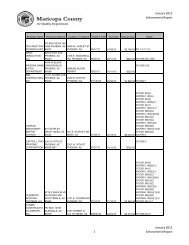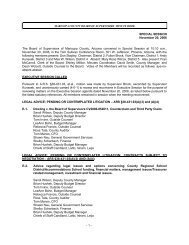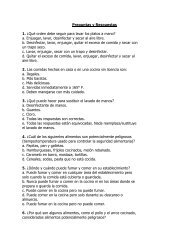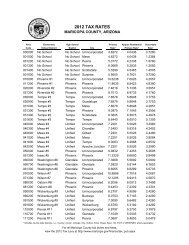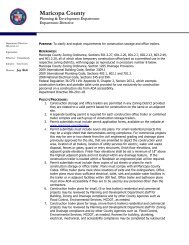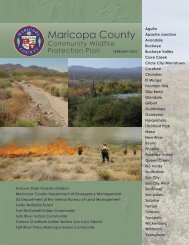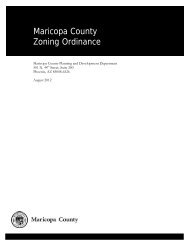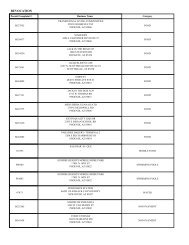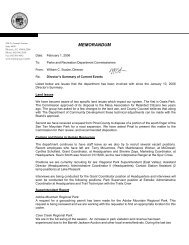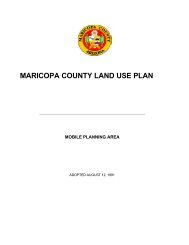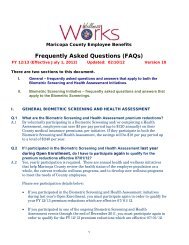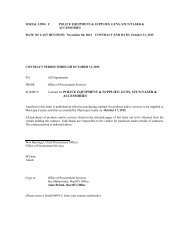ARIZONA GUARDIANSHIP LAW AND PRACTICE - Maricopa County
ARIZONA GUARDIANSHIP LAW AND PRACTICE - Maricopa County
ARIZONA GUARDIANSHIP LAW AND PRACTICE - Maricopa County
Create successful ePaper yourself
Turn your PDF publications into a flip-book with our unique Google optimized e-Paper software.
MARICOPA COUNTY PUBLIC FIDUCIARY<br />
<strong>GUARDIANSHIP</strong>/CONSERVATORSHIP <strong>LAW</strong><br />
<strong>AND</strong> <strong>PRACTICE</strong><br />
Gary B. Strickland<br />
<strong>Maricopa</strong> <strong>County</strong> Public Fiduciary
© 2011, Gary B. Strickland. All rights reserved.<br />
This material may not be reproduced, modified, or distributed, in any form or by any<br />
means, without the express prior written permission of the author.
Cicero, De Senectute, xi<br />
The fact is that old age is respectable just as<br />
long as it asserts itself, maintains its proper<br />
rights, and is not enslaved to any one, and to the<br />
last breath rules over its own domain.
National Probate Court Standards<br />
ST<strong>AND</strong>ARD 3.3.10 LESS INTRUSIVE ALTERNATIVES<br />
Commentary<br />
Scientific studies show that the loss—or perceived loss—<br />
of a person's ability to control events can lead to<br />
physical or emotional illness. Indeed, complete loss of<br />
status as an adult member of society can act as a selffulfilling<br />
prophecy and exacerbate any existing disability.<br />
Allowing persons potentially subject to guardianships to<br />
retain as much autonomy as possible may be vital for<br />
their mental health.
Source of Law<br />
U.S. and Arizona Constitutions<br />
A.R.S. Title 14<br />
A.R.S. Title 36<br />
National Probate Court Standards<br />
Administrative Code of Judicial Administration<br />
(A.C.J.A.)<br />
Local Rules of Practice for the Superior Courts<br />
Case Law
Minors<br />
Adults<br />
Types of Guardianships<br />
Testamentary<br />
Emergency<br />
Temporary<br />
Limited<br />
Permanent
Requirements<br />
for<br />
Establishment of a Guardianship<br />
A.R.S § 14-5304(B)<br />
Necessary to provide for demonstrated<br />
need<br />
Least restrictive<br />
Incapacity
The Sine Qua Non<br />
A.R.S. § 14-5101(1)<br />
"Incapacitated person" means any person who is<br />
impaired by reason of mental illness, mental<br />
deficiency, mental disorder, physical illness or<br />
disability, chronic use of drugs, chronic intoxication<br />
or other cause, except minority, to the extent that he<br />
lacks sufficient understanding or capacity to make<br />
or communicate responsible decisions concerning<br />
his person.
Priorities in the Appointment<br />
A.R.S. § 14-5311 :<br />
A. Any qualified person may be appointed guardian of an incapacitated person, subject to<br />
the requirements of section 14-5106.<br />
B. The court may consider the following persons for appointment as guardian in the<br />
following order:<br />
A guardian or conservator of the person<br />
An individual or corporation nominated by the incapacitated person<br />
The person nominated in the incapacitated person's most recent durable power of attorney<br />
The spouse of the incapacitated person<br />
An adult child of the incapacitated person<br />
A parent of the incapacitated person, including a person nominated by will or other writing<br />
signed by a deceased parent<br />
Any relative of the incapacitated person with whom he has resided for more than six<br />
months<br />
The nominee of a person who is caring for or paying benefits to the incapacitated person.<br />
The department of veterans' services.<br />
A fiduciary, guardian or conservator.<br />
If of equal priority, the court shall select the one best qualified to serve.<br />
For good cause, the court may disregard prioritization.
Priorities in the Appointment<br />
-A Public Fiduciary as Last Resort-<br />
A.R.S. § 14-5602 :<br />
A. The court shall appoint a public fiduciary for<br />
those persons or decedents' estates in need<br />
of guardianship, conservatorship or<br />
administration and for whom there is no<br />
person or corporation qualified and willing to<br />
act in that capacity.
A.R.S. § 46-140.01<br />
-Legal Resident Status-<br />
A. An agency of this state and all of its political subdivisions,<br />
including local governments, that are responsible for the<br />
administration of state and local public benefits that are not<br />
federally mandated shall do all of the following:<br />
1. Verify the identity of each applicant for those benefits and verify<br />
that the applicant is eligible for benefits as prescribed by this<br />
section.<br />
2. Provide any other employee of this state or any of its political<br />
subdivisions with information to verify the immigration status of any<br />
applicant for those benefits and assist the employee in obtaining<br />
that information from federal immigration authorities.<br />
. . .<br />
B. Failure to report discovered violations of federal immigration law<br />
by an employee is a class 2 misdemeanor. If that employee's<br />
supervisor knew of the failure to report and failed to direct the<br />
employee to make the report, the supervisor is guilty of a class 2<br />
misdemeanor.
Companion<br />
Therapist<br />
What a Guardian is Not<br />
Reformer (life-style changer)<br />
Warden<br />
Savior<br />
Surrogate Family Member<br />
Caregiver<br />
Healthcare Provider<br />
- Guardianship Consider the Alternatives<br />
Richard T. Vanderheiden in Life & Times (Fall<br />
2003)
Alternatives to a Guardianship<br />
Surrogate (A.R.S. § 36-3231)<br />
Medical or Healthcare Power of Attorney<br />
Medical Advance Directives<br />
Living Will<br />
Community and Social Services Assistance<br />
Adult Protective Services<br />
Family Assistance<br />
Representative Payee<br />
Limited and Single Transaction<br />
Guardianship
The Petition<br />
A.R.S. § 14-5303 :<br />
Any interested person may file a Petition<br />
The Petition must set forth, to the extent known:<br />
1. The interest of the petitioner.<br />
2. The name, age, residence and address of the alleged incapacitated<br />
person.<br />
3. The name, address and priority for appointment of the person whose<br />
appointment is sought.<br />
4. The name and address of the conservator, if any, of the alleged<br />
incapacitated person.<br />
5. The name and address of the nearest relative of the alleged<br />
incapacitated person known to the petitioner.
The Petition Continued<br />
6. A general statement of property with an estimate of its value<br />
7. The reason why appointment of a guardian or any other<br />
protective order is necessary.<br />
8. Identify the type of guardianship requested.<br />
9. If a general guardianship is requested, the petition must state<br />
that other alternatives have been explored and why a limited<br />
guardianship is not appropriate. If a limited guardianship is<br />
requested, the petition also must state what specific powers are<br />
requested.
Venue<br />
A.R.S. § 14-5302<br />
The venue for guardianship proceedings for an<br />
incapacitated person is in the county where the<br />
incapacitated person resides or is present. If the<br />
incapacitated person is admitted to an institution<br />
pursuant to order of a court of competent<br />
jurisdiction, venue is also in the county in which<br />
that court sits.
Notice Issues<br />
Fourteen (14) days prior to Hearing to the<br />
persons designated in A.R.S. § 14-5309<br />
Method and time of notice; A.R.S. § 14-<br />
1401<br />
Exceptions to Notice<br />
- Waiver; A.R.S. 14-1402<br />
- Emergency Petition A.R.S. § 14-5310<br />
- Must allege immediate and<br />
irreparable injury; A.R.S. § 14-<br />
5310(B)
Waiver of Notice for Temporary Guardianship Appointment<br />
A.R.S. § 14-5310(B)<br />
B. The court may enter a finding of interim incapacity and may<br />
appoint a temporary guardian without notice to the proposed ward<br />
or the proposed ward's attorney only if all of the following<br />
conditions are met:<br />
1. It clearly appears from specific facts shown by an affidavit or by<br />
the verified petition that immediate and irreparable injury, loss or<br />
damage will result before the proposed ward or the proposed<br />
ward's attorney can be heard in opposition.<br />
2. The petitioner or the petitioner's attorney certifies to the court<br />
in writing any efforts that the petitioner or the petitioner's<br />
attorney has made to give the notice or the reasons supporting the<br />
claim that notice should not be required.
Waiver of Notice for Temporary Guardianship Appointment<br />
Continued<br />
A.R.S. § 14-5310(B)<br />
3. The petitioner files a request for a hearing on the petition.<br />
4. The petitioner or the petitioner's attorney certifies that notice<br />
and all filed reports and affidavits will be given to the proposed<br />
ward by personal service within the time period the court directs<br />
but not in excess of seventy-two hours following entry of the<br />
order.<br />
5. The petitioner files a report from a physician, a registered nurse<br />
practitioner or a psychologist detailing the need for a guardian and<br />
the basis for the emergency unless the report is waived by the<br />
court on a showing of good cause by a party to the action.
The Hearing<br />
Evidence Required in Support of the Petition<br />
A.R.S. § 5303(C) :<br />
Court-appointed Counsel (CAC)<br />
Investigative Report based on face-to-face<br />
interview of Proposed Ward<br />
Investigator’s interview of Proposed<br />
Guardian<br />
Medical Report<br />
Testimony of Proposed Ward, if requested<br />
Hearing may be closed, if requested
Evidence Required in Support of the Petition<br />
-The Medical Report-<br />
D. A report filed by a physician, psychologist or registered nurse acting<br />
within that person's scope of practice shall include the following<br />
information:<br />
1. A specific description of the physical, psychiatric or psychological<br />
diagnosis of the person.<br />
2. A comprehensive assessment listing any functional impairments of the<br />
alleged incapacitated person and an explanation of how and to what extent<br />
these functional impairments may prevent that person from receiving or<br />
evaluating information in making decisions or in communicating informed<br />
decisions regarding that person.<br />
3. An analysis of the tasks of daily living the alleged incapacitated person is<br />
capable of performing without direction or with minimal direction.<br />
4. A list of all medications, their dosage, and a description of the effects<br />
each medication has on the person's behavior.<br />
5. A prognosis for improvement in the alleged incapacitated person's<br />
condition and a recommendation for appropriate rehabilitation or care plan.<br />
6. Other appropriate information.
The Hearing<br />
Standard of Proof<br />
Clear and Convincing Evidence<br />
A.R.S. § 14-5304(B)
Trial by Jury<br />
A.R.S. § 14-5303(C)<br />
An alleged incapacitated person may<br />
have a jury trial as a matter of right.
The Hearing Participants<br />
Proposed Ward<br />
Court-Appointed Counsel (“CAC”)<br />
Guardian Ad Litem (“GAL”)<br />
Family and Friends<br />
Court-Appointed Investigator<br />
Physician(s)<br />
Social Worker(s)<br />
Public Fiduciary
The Hearing:<br />
Evidentiary Considerations<br />
The Rules of Evidence apply. However, there may be some<br />
laxity in Probate, depending upon the proclivities of the<br />
Judge/Commissioner.<br />
As always, the cornerstone is founded in Rules 401 and 403,<br />
Ariz.R.Evid. Regardless the laxity in admissibility, argue<br />
diminishment in weight under 403. (See Appendix D)
A.R.S. § 5312 :<br />
Guardianship Administration<br />
Duties and Responsibilities<br />
A. A guardian of an incapacitated person has the<br />
same powers, rights and duties respecting the<br />
guardian's ward that a parent has respecting the<br />
parent's unemancipated minor child, except that<br />
a guardian is not liable to third persons for acts of<br />
the ward solely by reason of the guardianship.
Guardianship Administration<br />
Duties and Responsibilities<br />
- Continued<br />
Establish where the Ward lives.<br />
Arrange for Ward’s training and education.<br />
Give consents approvals necessary for medical or other professional care.<br />
If no conservator for the estate of the Ward has been appointed, the<br />
Guardian may:<br />
(a) obtain public benefits.<br />
(b) receive money and tangible property on behalf of the Ward.<br />
File reports to the Court.<br />
Encourage the Ward to develop maximum self-reliance and independence.<br />
Find the most appropriate and least restrictive setting for the Ward.<br />
Make reasonable efforts to obtain medical, psychological, social services.<br />
Take into consideration the ward's values and wishes in all decisions.<br />
If the ward is developmentally disabled, seek services that are in the best<br />
interest of the Ward
Guardianship Administration<br />
A Guardian may assert the Constitutional<br />
rights of the Ward to refuse medical<br />
treatment using a “best interests” of the<br />
patient standard.<br />
- Rasmussen by Mitchell v. Fleming,<br />
154 Ariz. 200, 741 P.2d 667 (App. 1986)
Substituted Judgment<br />
The Substituted Judgment standard requires that the surrogate<br />
attempt to decide a question of care as would the incapacitated<br />
person if able; based on statements made while competent.<br />
“[A] trial court may consider any otherwise admissible evidence<br />
manifesting the incompetent's own desires while competent. Such<br />
evidence may include written manifestations of the incompetent's<br />
intent . . . as well as any statements made to third parties, such as<br />
the guardian, family members or friends, while competent.” -<br />
Ruvalcaba v. Ruvalcaba, 174 Ariz. 436, 444; 850 P.2d 674, 682<br />
(App. Div. 1,1993)<br />
Limitations:<br />
Not contrary to accepted notions of well-being<br />
Not violative of criminal/health laws
Extraordinary Medical Procedures<br />
Necessity to seek a Court Order in those<br />
instances where the Ward is prescribed<br />
extraordinary medical treatment and care.<br />
A.C.J.A. § 7-202(J)(3)(N)<br />
What constitutes an “extraordinary” medical<br />
procedure?<br />
Examples:<br />
- Abortion - Sterilization<br />
- Ventilator Removal – Psycho surgery
Alternative Procedures for Getting<br />
a Question Before the Court<br />
Petition for Instructions<br />
A.R.S. § 14-5416(B)<br />
Order to Show Cause (“OSC”)<br />
6(d) Ariz.R.Civ.Proc
Terminating a Guardianship<br />
Terminates upon death of Guardian or<br />
Ward – A.R.S. § 14-5306<br />
May terminate upon Petition and Court<br />
Order – A.R.S. § 14-5307<br />
The Guardian has an obligation actively to<br />
work for termination of the Guardianship<br />
– A.R.S. § 14-5312(A)(7)<br />
(See Appendix C)
Title 36 Guardianships<br />
A.R.S. § 35-540<br />
Court Ordered Treatment (“COT”)<br />
Gravely Disabled (“GD”)<br />
Persistently or Acutely Disabled (“PAD”)<br />
Unwilling or Unable to Accept Treatment<br />
Treatment in a program of outpatient treatment.<br />
Inpatient treatment in a mental health treatment agency,<br />
veterans administration hospital, in the state hospital, or in<br />
a private hospital
Title 36 Guardianships<br />
- Continued<br />
A.R.S. § 35-540<br />
Court-ordered Investigation for a Guardianship for the Gravely Disabled<br />
Qualified appointees:<br />
(a) the mental health treatment agency that is providing inpatient or<br />
outpatient treatment,<br />
(b) a court appointed visitor, or<br />
(c) the public fiduciary, if there is no person willing and<br />
qualified to act<br />
Notice required.<br />
Investigative Report required<br />
Petition Required
Title 36 Guardianships<br />
-Continued<br />
A.R.S. § 36-540<br />
H. If, on finding that a patient is gravely disabled, the court<br />
also finds that the patient is in need of immediate<br />
guardianship for the purpose of protection of the patient or<br />
for the purpose of carrying out alternatives to court-ordered<br />
treatment, the court may appoint as a temporary guardian a<br />
suitable person or the public fiduciary, if there is no person<br />
qualified and willing to act in that capacity.<br />
I. If, on finding that a patient is gravely disabled, the court<br />
also learns that the patient has a guardian appointed under<br />
title 14, the court may with notice impose on the existing<br />
guardian additional duties pursuant to section 14-5312.01.



